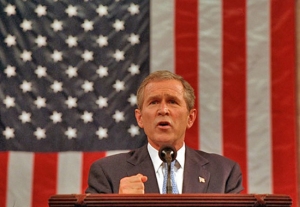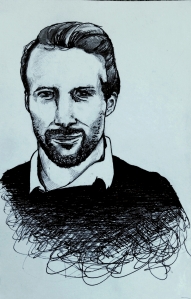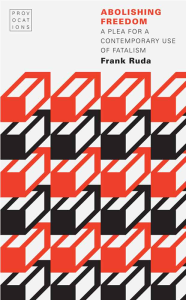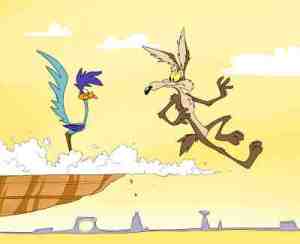In the latest HKRB Interview, philosopher Frank Ruda has an extended discussion with our co-editor Alfie Bown about all aspects of freedom, including whether we should even want to be free. Topics range from Bush to Merkel and Marx to Dolar.
Frank Ruda is a philosopher and one of the most prominent scholars of Hegel and of Psychoanalysis in the world. He is a member of the department at the Freie Universität Berlin and a visiting professor at the Scientific Research Centre in Ljubljana. He has published a number of books and articles on Hegel, Badiou and psychoanalysis, and has a co-written book with former HKRB interviewee Agon Hamza.
His latest book is a controversial and important intervention into political and theoretical discussion. Published with Nebraska University Press, Abolishing Freedom claims that we need to do away with kind of the ‘freedom’ we often believe in today and completely re-conceptualize what it means to be ‘free,’ questioning whether freedom is something we ought to pursue at all. Here I had the chance to ask Frank some brief questions about this groundbreaking book.
Frank Ruda, Abolishing Freedom: A Plea for the Contemporary Use of Fatalism (Lincoln: Nebraska University Press, 2016) 191pp.
Alfie Bown: Let’s start at the beginning. Can you say something about why current conceptualizations of freedom are problematic, about why freedom is, to quote your little preface, ‘a signifier of oppression’?
Frank Ruda: The signifier “freedom” can in general bring together a very mixed crowd of people, from nearly all political camps, all on one side. Of course, this is not necessarily a problem and can even be a good thing. Yet, this can also generate some conceptual confusion. Take the former US president, George W. Bush. He was inter alia a militant – and military – supporter of freedom. Today, one could not be a Western head of state, or in the parliament if one is not an avid adherent of freedom, of our freedom, committed to defending it against injury, sometimes adding insult to it. “Freedom” is in the West, at least, what makes living our way of life. It is a name that condenses what “we” are. For, there are also those who do either not think that freedom is an essential category of collective and / or individual life, or who – and this often proves even more irritating – have a fundamentally different idea of what freedom is or means. What for us can appear to be the ultimate essence of freedom thereby may appear to others as its very opposite. So, in general it is not always already objectively given and clear who is a defender of freedom and who isn’t. Today, many things are done in the name of freedom that do effectively turn against it. A telling recent example is the American company, Virgin Enterprise. They claimed that having a prescribed number of vacation days can prove unproductive for their employees. They should decide for themselves how often they think they need a leave, freeing them from all external constraints (This was presented as being up to date: “Flexible working has revolutionised how, where and when we all do our jobs. So, if working nine to five no longer applies, then why should strict annual leave (vacation) policies?” – note: this could also work as a slogan for working from nine to nine and abolishing vacation altogether).

Of course, there was a condition: holidays can only be taken when the work is done. And the employees are taken to know when that is. What then happened was that the number of effectively taken holidays decreased further than ever. There emerged an internal (super-egoic) pressure of self-control which proved more oppressive than the prior external regulations. This was an effect of them supposedly “freely” deciding – competition (among the employees) can reign even harsher doing away with external administration. This brought about what Hegel calls “over-active consciousness” which is less free because it continually feels compelled to freely determine its own freedom.
“Freedom” does then function as a kind of “empty signifier”, that is, as E. Laclau once put it, hegemonically determined by (filled with) a specific interpretation. It can become effectively hegemonic when it as the same time also manages to allow for a multiplicity of other particular renderings of freedom (freedom is freedom of expression, but also of commerce, of the movement, etc.). These kind of filled empty signifiers for Laclau structure the social spheres and politics emerges when such a hegemonic interpretation (or filling) is challenged. Then all differing particular interpretations (say Merkel, Hollande, etc.) align and present themselves to be just particular renderings of freedom as such. An attack on the freedom of expression can then be perceived as attack on “freedom” tout court, etc. This can generate a peculiar disorientation, because one might end up defending what one does not want to endorse. In this sense, “Abolishing Freedom” tries to break or attack this unwilling alliance with what one might call “ideology of freedom”.
But “freedom” does not only allow a veiled particular interest to gain a universalist appearance, but it can also produce its own opposite. Think of examples analyzed by S. Žižek: people do not find a long term employment and this is presented to them as a chance to explore ever new options; the freedom of not having a health insurance is presented as freedom from state control, etc. Nonetheless, how could anyone one be against freedom? Even against better insight, freedom is nothing anyone would like to give up, not even when it is de facto already gone. This is where its disorienting and oppressive quality lies. What to do when freedom becomes a synonym of oppression, even though a perfidious one? It is not enough to constantly appeal to its true meaning, which is by far not undisputed. So, if it functions as instrument of oppression, freedom is not something that one should endorse no matter what. Yet, that this seems so impossible shows that it became a peculiar contemporary fetish one shall better not touch.
Already Marx described “freedom” as a crucial component of the functioning and dynamics of capital. In Capital he notes that within the “Eden”, that is the legal framework on which capitalist forms of production rely, “[t]here alone rule Freedom, Equality, Property and Bentham.” Freedom is part of a series of signifiers, which gains its consistency by adding to it another term of a fundamental different quality: Bentham, the utilitarian philosopher. It is his name that consistently determines the series hinges. “Freedom” here does not only mean that the exchange between two equals, laborer and capitalist, is determined by their equally free wills, but it generates the effect that their free will is determined by that which Bentham stands for: pure self-interest. This is what holds together the series of terms. Mladen Dolar has added another crucial dimension to this analysis: He emphasized that suturing this series with its last contingent element has a peculiar effect, namely the very contingency of this assemblage is turned into a necessary concatenation. This how naturalization works.
This is crucial because one can find in the history of philosophy an often repeated diagnoses of this problem. It seems natural to people to assume something is freedom, yet de facto this leads them to endorse being determined, oppressed, enslaved, etc. There is a problematic metaphysics of freedom that is a constitutive part of the “ideology of freedom.” Its main trait consists in naturalizing and substantializing “freedom” into something that we have, into a possession. And any possession can be (and often has to be) invested. Yet, this idea has a calming and assuring effect: if you always already have freedom, you may need to defend it, but you do not need to strive for it. One feels free, even though one is not. This is what Kojévè once called, in commenting Hegel’s characterization of the Stoic slave, who feels free, even when he is forced to work, the “slave ideology” – the slave ideology of freedom allows to avoid confronting the actual situation. Freedom is paradoxically the only possession of the slave. This possession takes a specific form, the form of a “capacity”. Why? Because a capacity can be actualized, but already has an actuality, even when not actualized (we are able to eat, even when we are not eating for example). To take freedom to be a capacity means to assume that there is an actuality of freedom before the becoming actual of freedom – an actuality of a potential, of a possibility. This is the “ideology of the possible” – but who could have anything against possibilities? I argue that the possible is today also a disorienting category, because it is constitutive to such an understanding of freedom. The outcome of this peculiar conglomerate is that the most fundamental version of freedom as capacity that we have in our possession is identified with a freedom of choice: the freedom to choose X or non-X. This is what the philosophical tradition referred to as liberum arbitrium. I am and remain free, even if I do not realize freedom –my rather profane argument is that one should always remember (one can still learn this from Hegel): not-realized freedom is not(-realized) freedom.
The history of modern rationalist philosophy frequently attacked the idea that freedom is an always already given capacity. This criticism is a criticism of what W. Sellars once called the “myth of the given”, a criticism of what I call the “myth of the givenness of freedom” (“the ideology of freedom”) argues that it is rational to reject this identification of freedom with a capacity and to begin with, assume that one is not free. There is one truly bad guy, so to speak, in the history I reconstruct: the one with whom freedom came under the yoke of the capacity, namely Aristotle. I am here ironically mimicking a Heidegger’s history of metaphysics and at the same time seeks to exaggerate it. Not Plato is at the origin of all evil, but Aristotle. And there is a reason why so many thinkers today are (closet) Aristotelians. So, if the history of all hitherto philosophy has been the history of struggles between Plato and Aristotle, this struggle enters a new stage, in modernity it became a struggle over freedom. Exiting the ideology of freedom, its functioning as a signifier of oppression, means to find a way out of the mythical identification of freedom with a given capacity. And this means primarily to assume that we are not free. Freedom is not a given. Not a capacity. Not something we just have or are born with. Not inscribed into our nature. But something we may or may not attain.

Frank Ruda, by ChinHsin Esther Kao
AB: In the book you discuss a lot of conceptualizations of freedom, from the Aristotelian to the Freudian. As someone working on psychoanalysis myself, I am interested in your discussions of ‘psychic freedom.’ From a properly psychoanalytic point of view, you write, it is ‘fully rational and reasonable to give up the idea of free will and psychical freedom’? Can you explain why it might be politically or socially useful or even vitally necessary to do this, to give up on a positive investment in psychical freedom?
FR: Freud has a beautiful argument why one should start from the assumption that there is no psychic freedom. For otherwise there are things that happen for no reason at all. Slips of tongue, for example. Yet, if these nonetheless exist, one will never be able to understand them and infer that they do not matter. Freud suggests, this was precisely the attitude of most people working in psychology (and philosophy) for a long time: There are things that deserve rational explanation, and there are also things we cannot explain and comprehend, there material existence can thus be ignored. These things became the paradigm of (the ideology of) psychic freedom. From this perspective a slip of tongue or any kind of parapraxes is either explained away (“this is because I did not pay attention, was tired, distracted”, etc.) or one denies it all significance. But thereby one ultimately ends up assuming that there is no reason as to why someone used this or that expression (“it is just a figure of speech, it just came to mind”) or says more (or less, or both) than he wanted to say.
Slowly, the assumption of psychic freedom keeps on spreading and starts to limit what can be rationally explained and deserves any serious attention. These kinds of convictions stand behind Freud’s motivation to attack the idea of psychic freedom. They lead to a limitation and negation of reason and rationalism. If our psyche is free, in this understanding, it exceeds rational comprehensibility. But then it is hard to say what freedom is. Thereby the assumption of psychic freedom leads us into an incomprehensible determinism – we become unable to say what freedom is (and should therefore never care about the unwilling epitomes of freedom, like slips of tongue, etc.). Freud’s gesture defends reason and rationalism against this kind of freedom. He does so by totalizing reason: everything can be understood, but this also means: anything deserves attention. It is a move that one can also find in Hegel – when he early on talks about the “totality of reason” (Vernunfttotalität). Rationalism seems impossible if it does not totalize itself, otherwise you assume that certain things just fall outside the scope of reason. This is always the beginning of the end of reason.
This gesture enables Freud to pay attention to the most marginal things, otherwise too irrelevant to bother with, the “dregs of the world of appearances”. And they surprisingly led him into investigating the heart of the human psyche. The embrace of an utter “psychic determinism”, as Freud calls his totalization of rationalism – fatalism, in my coinage – produces an inversion of the classical hierarchy of the marginal and the essential (and consequentially even of the one between existence and inexistence). It will also prove to be the very groundwork for the idea that the Ego is not the master in its own home. What does this mean politically? I do not present a political position in the book, I only clarify the preconditions of what it means to rationally speak about freedom.
But to give at least a hint: Fredric Jameson stated that when all grand narratives started to crumble, people also started rejecting the concept of totality (there seemed to be a direct link between totality and totalitarianism). This led to a peculiar kind of disorientation, because one became unable to see that or how things hang together. This even enforced the assumption that they are not related at all (say the Apple store that I visit, taxation politics in Ireland and shitty working conditions in India) and things happen for no comprehensible reason whatsoever. Assuming that there is a totality (say: capitalism that has a specific logic which can be understood) means to somehow translate the attack on psychic freedom into the social, political and economic realm. To endorse the idea that things can be comprehended (and that there is no evil that defies thinking altogether) can help to gain some orientation. In this sense, it helps to still speak about capitalism. Because if you do not want to do this, you have a similar problem, mutatis mutandis, that Freud depicted.
There is a wonderful fatalistic line by Samuel Beckett that has some political potential. At one point he comes up with a quite comic description of a problem: “I see nothing. It’s because there is nothing, or it’s because I have no eyes, or both, that makes three possibilities to choose from.” Sometimes it is important to see the minimal difference by means of which a third option appears. Sometimes the problem does not lie in not being able to solve the problem, but in seeing that the problem is what we perceive as problem (which blinds us for our own involvement in it). Politically, although this is only a first step, one should opt for Beckett’s third option. This is certainly not (yet) emancipation. But it helps to avoid seeing what is not there with eyes one imagined. This could prove a valid starting point for thinking about politics.

AB: For you, fatalism represents an answer or an alternative to the problems we run into with freedom today. In what way is fatalism, or a certain kind of fatalism (for you do mention ‘a bad kind of fatalism’ in which everything seems predetermined), an alternative to the situation we talked about in the first question?
FR: Fatalism is not the solution, but a preparatory step for endorsing freedom properly. This does not lead into a simple (and not even complex) objective determinism. Fatalism, in my sense of the term, means to assume that everything is always already lost, that there is nothing (not even nothing) to rely upon. It means to start from the assumption that, for example, there never will be emancipatory politics; no art worthy of that name, that we will never be free and other apocalyptic ideas. Fatalism insists that assuming such ideas is fully rational. It does not mean that – and this is crucial –anything we will attempt to do will ultimately fail. It is not a tragic world-view of whatever kind, not a sort of (political, artistic, etc.) existentialism, or pessimism – all these positions come with a residue that they take for granted (the human condition, the worldly or social conditions, etc.). I am rather close to what Nietzsche called active nihilism, or, in my reading, what Hegel called absolute knowing.
This is not meant to depress anyone. It rather provides an antidote to the dominant mythic misconceptions of freedom. I take my cue from an often unacknowledged fact: The most influential rationalist philosophers of freedom (Descartes, Kant, Hegel) were at the same time defenders of what cannot but seem to be the direct opposite of freedom: divine predestination. I argue that divine predestination becomes a conceptual, therapeutic tool to get rid of mythic conceptions of freedom. Fatalism does not rely on any divine predestination, but it tries to rescue its therapeutic value. One fatalistic axiom that is useful for the ideological battle in a time where “freedom” is part of the problem and not of the solution is: never act as if you were free, but rather act as if you are not free. Paradoxically, this is a liberating shift because it puts us subjectively in the position we are actually in.
A rationalist, i.e. a fatalist gives up any myth of the givenness of freedom and assumes that he will never be free unless something happens to him that will force him to be free. This does not at all condemn anyone to a passive standpoint. For, it takes a lot of effort to get rid of assuming a givenness of whatever kind. Already Luther saw that such an assumption cannot but provoke anxiety. Today anxiety has no good press, because one constantly translates anxiety into fear. Fear always has a relation to an object in the world (say the guy with the machete attacking me or the refugee, or both at once), anxiety does not have an object of the world as its object but is related to something that happens. If fatalism conceptually provokes anxiety, this might be a first step in overcoming an ideological framework which constantly assures us that we always already free and only need to fear those who do want to take away what is ours.
If one finds a point which produces anxiety, there also emerges the very possibility of courage. And courage first and foremost names a way of gaining and sustaining an orientation. Courage is not a virtue we can just adopt (and there is a reason why the category of courage is almost completely absent from politics today). The step from anxiety to courage is precisely the constitution of a new kind of orientation – courage being a way to (put to) work (with) anxiety (even though this is a longer discussion). So, my plea is to have the courage to be a fatalist. The history of philosophy encourages us to do so: It is fully rationalist to give up the idea of freedom as something one has in one’s possession. If this generates anxiety, this can only be a good sign, new courage might follow from it.
AB: A slightly different question to finish on, if you’ll allow it. For me, perhaps it is your argument about Hegel which best helps us to conceptualize the relationship between fatalism and freedom. This section introduces a comparison between freedom and mastery. I wonder if you feel affinity or tension with the ideas of accelerationism, say, those of Nick Srnicek and Alex Williams, for whom general espousing of freedom as a great thing should be eliminated and replaced by the quest for a new kind of ‘mastery’ over things. I provisionally agree with this, which I think is a kind of Leninist argument that we need to take responsibility for the types of freedom we create or for social organization more generally, rather than simply mindlessly claiming that we are a ‘free’ society. Yet, your book made me think that fatalism might be a third option that is neither mastery nor freedom, an option which involves an acknowledgement that you are never the master and that you are never free, but that you still have a responsibility to make the revolution happen. Have I got it totally wrong here?
FR: Let me specify again the logical place of the fatalism I propose and why I do not lay out any normative claim about political action or organization. My reference here is Descartes. He suggested that within a process of dismantling all previously assumed evidence through radical doubt and without having reached any certainty proper yet, that one nonetheless needs a provisory morality, some guidelines of orientation. Fatalism provides in my reading such a provisory morality, also valid for today. This is why fatalism offers a form of orientation within a phase where one is on the lookout of how to rethink political organization and action proper. Therefore, I do not endorse a Leninist politics that, at least with Lenin, started from given economic contradictions and assumed that politics emerges inter alia as and in the form of a practice that intensifies these contradictions. I do not think that politics is something that is always already latently given in economy, and that the move to emancipation is to re-code it and deal with them differently. Politics can be completely absent (and administration can reign). Yet, this absence needs to be understood. Therefore, I take a step back from any such proposals (although certainly I am more sympathetic to some than to others).
But I agree with your description, in the terms of the book: freedom is something that one does not have, it happens to you, and when it does, you are radically responsible for it, even though you are not its author. But the crucial question the fatalism concept tries to answer is the following one: how to prepare for such an event, for something for which one cannot prepare? Or more specifically: for the advent of freedom? Or, in a cheesy example: how to prepare to fall in love? My answer is fatalism. Start from assuming it will never happen, because only thereby one avoids constantly to look for signs, possibilities, engages in problematic forms of activity and so forth, which often lead nowhere. This gesture is similar to how Lacan defined psychoanalytic cure: it elevates an incapacity to a point of impossibility. Fatalism for me is a form of how this elevation, a conceptual cure of misunderstanding of freedom is conceived of in the history of modern philosophy. But there is a comic twist to this.

Alain Badiou once claimed that today one has to write the comedy of democracy, and in a sense this is what I tried to do (which is why I defend that fatalism is ultimately a comic gesture). Why comedy? Because the comic character is able to do (and thus affirm) something impossible. And the claim that the book tries to defend has to do with such impossible acts and impossible affirmations. Just think of the cartoon character which runs over a cliff and even when he has no ground under its feet, keeps on running. I think that subjects are able to do such a thing. Yet, this is at the same time an indication of the possible problem we spoke about earlier: what if one takes the absence of a ground for a ground (the absence of freedom for freedom)? Then it might help to shift the gaze a bit, realize one is walking, if at all, on thin air and start to fall. Fatalism is the moment where the gaze turns and the fall begins, but I contend that this is the very precondition for starting to run again on even thinner air – yet, this would be a running of a different kind.
Alfie Bown is the co-editor of the HKRB and the author of Enjoying It: Candy Crush and Capitalism (Zero, 2015) and The PlayStation Dreamworld (Polity, forthcoming).
ChinHsin Esther Kao is the featured illustrator on this post. She is an undergraduate at Wheaton College (IL) and double majors in English and Philosophy. She was the Critical Essay Editor for the college’s independent magazine The Pub and the Art Editor for Kodon. Esther also writes for the online publication The Odyssey and is interning forInheritance magazine under Fuller Seminary in Pasadena, California.
The HKRB Interviews series specializes in new books in philosophy and critical theory. Recent interviews have included Simon Critchley, Jodi Dean and Srecko Horvat.
Please support the HKRB and look out for more interviews and reviews by following our Facebook page.

